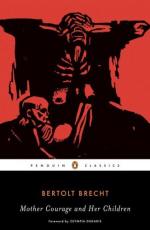|
This section contains 377 words (approx. 1 page at 400 words per page) |

|
Mother Courage and Her Children Summary & Study Guide Description
Mother Courage and Her Children Summary & Study Guide includes comprehensive information and analysis to help you understand the book. This study guide contains the following sections:
This detailed literature summary also contains Bibliography and a Free Quiz on Mother Courage and Her Children by Bertolt Brecht.
First produced in Zurich, Switzerland, in 1939, Bertolt Brecht' s Mother Courage and Her Children is considered by many to be among the playwright's best work and one of the most powerful anti-war dramas in history. The play is based on two works by Hans Jacob Christoffel von Grimmelshausen: his 1669 novel, Simplicissimus and his 1670 play, Courage: An Adventuress. Many critics believe Mother Courage to be the masterwork of Brecht's concept of Epic Theater. This dramatic subgenre, pioneered by Brecht sought to present theatre that could be viewed with complete detachment. Through such techniques as short, self-contained scenes that prevent cathartic climax, songs and card slogans that interrupts and explains forthcoming action, and detached acting that wards off audience identificationtechniques that came to be known as "alienation effects"the playwright sought to present a cerebral theatrical experience unmarred by emotional judgement. Brecht wanted audiences to think critically and objectively about the play's message, to assess the effects of war on an empirical level.
Much to Brecht's chagrin, however, audiences identified with the play on a deeply emotional level, drawing immediate parallels between the Thirty Years' War that the characters face and the horrors of World War II. Mother Courage was written in 1938-39, just as World War II was breaking out in Europe. Brecht completed the play while living in exile, having fled his native country in the face of a rising fascist government. It would not be until 1949 that Mother Courage would debut in Brecht's homeland, with a production in East Berlin, East Germany. Brecht set the play during the monumental Thirty Years' War, which occurred three centuries earlier, instead of the contemporary conflict. Brecht hoped that, because the events depicted were removed in time, audiences would be more objective when they viewed the play. But many of the European viewers and critics had first-hand experience with the horrors of war. They easily found personal meaning in the play's setting and story. Brecht rewrote the play for the 1949 East German production, hoping to minimize an emotional response from the audience, but Mother Courage still proved a powerful experience. In the decades since its debut, the play has grown to be regarded as one of the twentieth century's landmark dramas and a potent condemnation of war.
Read more from the Study Guide
|
This section contains 377 words (approx. 1 page at 400 words per page) |

|



